|
|
2023
οι ΑΞΙΕΣ ΖΩΗΣ ΣΤΗΝ ΚΕΡΚΥΡΑ ας τελοσ
Κατεβάστε την ελληνική έκδοση της έκθεσης εδώ (Download Greek version of report)
The "Values of Life" in the Penitentiary Department of the Corfu Prisons - Oct 2023
We responded with great interest to the invitation, which we received from the staff of the Penitentiary of Corfu Prisons, for the organization of an experiential seminar on "Life values in the workplace". It was a challenge for us. We decided, after a discussion among the members of the Board, that this should be carried out by Lena Koutsika, President of the Association and Sofia Kalogridis, Vice President. The seminar, after being approved by the Directorate of Prisons, took place on Saturday, 29/04/2023, 14.00-19.00, at the Prisons.
The seminar was announced by the President of the Workers' Association, Mr. I. Fronimos, on the website: www.startmediacorfu.gr/imerida-sto-sofronistiko-katastima-kerkyras
The seminar was attended with interest by the majority of the staff (20 employees), despite their workload. Among them were workers with many years of experience in prisons, as well as newly appointed ones. However, they all showed the same interest in developing meaningful relationships in their workplace and in general in improving working conditions, in a particularly demanding workplace.
- We devoted the first part to getting to know each other, telling each one where he got his name from. So even those who have known each other for years had the opportunity to learn something new about their colleague, enjoying everyone's stories. We continued with the "net of relationships" technique, where everyone mentioned an important activity that they carry out in their free time. Some of them were: Philanthropy, football, sailing, traveling, reading, fishing, etc.
- Then, through open-ended questions, making dialogue, we explored what life values are and what values they would like to distinguish their lives in general. The values mentioned were: love, responsibility, cooperation, respect, family, philanthropy, justice. From all these values, we focused on the value of cooperation in the workplace.
- We were randomly divided into groups of five people. The division into groups highlighted the importance of cooperation between prison staff because:
- Improves security and order within prisons, as staff can react quickly and efficiently to any crisis or problem.
- It enhances the professional development and training of staff, as they can share knowledge, experiences and best practices with each other.
- Helps create a positive and respectful work environment where staff feel valued, supported and committed to their mission.
The first part was closed with the imprint on paper of what was discussed in each group.

In the second part of the seminar we talked about the value of art in our lives and then we edited the painting "The Children's Concert" by G. Iakovides (1853-1932).
The elaboration of the table was connected to the theme of the seminar: "Cooperation in the workplace", considering that the topic of the table lends itself particularly well to deepening this issue. As written by H.E. Luccock (1960): “Nobody can sing a Symphony by themselves. It takes a whole orchestra to work together to play it."
The table was analyzed using the 4-phase method of D. Perkins (1994).
✓ First, simple observation of the artwork.
✓ Open, adventurous observation of the work of art.
✓ Detailed and in-depth observation of the artwork.
✓ Holistic observation of the artwork and reflection.
In this context, after the aesthetic enjoyment of the painting and its observation based on the questions: What do you see, what do you think, what do you wonder, but also the deeper observation-analysis with the questions: What else do you see that you did not see initially, what symbols do you spot, what mnm, what are your feelings, group members were asked to connect the content of the board with the theme of cooperation by answering questions such as:
What constitutes these children as a group? What is the role of diversity in the group (the child with the watering can)? Why some stay outside the group? What is the role of those who stand outside it? What makes it difficult for us to cooperate, but also what does it offer us? What are the advantages of working in a team?
The team members' responses referred to their own experiences of collaboration, from the workplace, which were "illuminated" by the analysis of the artwork, recognizing that art can contribute to a deeper understanding of issues in our daily lives.


Values and Human Rights Festival in Strani Hill, Zante - 28th May 2023
Anda Katsaitou, Denia Patra, Athanasia Glezaki and Anna Maria Liveri organised a values and human rights festival in Zante on 28th May 2023 which involved the participation of various schools and met with great success.
Children dream of a life with meaning, values and human rights.
10am - 10.30am - Greetings, school painting exhibition
10.30am - 11am - Values workshops:
Tolerance - Rights to life and participation. For children 3-4, Ms Syggouna.
Unity - Right to play. For children 4-6, Ms Zenakou and Ms Robola.
Cooperation - Freedom to think and speak. For children 6-7, Ms Matsoukatidou.
Respect - Right to equality. For children 7-8, Ms Avdela and Ms Saitanidou.
Happiness - Freedom to express oneself. For children 8-9, Ms Vragala and Ms Sklavounou.
Responsibility - Right for a proper standard of living. For children 9-10, Ms Saranditi and Ms Glezaki.
Love - Right to having a name, a certain nationality and identity. For children 10-11, Ms Katsaitou and Ms Patra.
Freedom - Right to freedom. For children 11-12, Ms Kondoni and Ms Deli.
11.45am - 1.15pm - School presentations:
Thematic units
"Chidren sing together" - 2nd primary school
"How I deam of my life" - 3rd primary school
"Listen to us"> - 3rd primary school and Katastari primary school
"We are aware of our rights" - 5th primary school
"The history of Unicef" - 6th primary school
"If all the children of the earth" - 1st primary school of Riza
"Small books - important rights" - primary school of Northern Zante
"Where there is love" - 3rd primary school of Riza
Xenopoulios Library Values Week, Zante - 21st - 25th August 2023
President of Xenopoulios Library in Zante Anda Katsaitou, and Denia Patra organized a week long Values Workshop last summer.
The library has hosted numerous values seminars, workshops and activities for twelve years now, that is, since 2011.
This time the focus was on the values of equality, respect and democracy. The workshops were full of activities such as drawings, participation in games, collective formation of a chart with male/female occupations which in the end became a chart of common jobs and occupations and triggered a discussion on gender equality and modification of traditional standards and expectations.
Other activities included finding my own good qualities, spotting my partner's and everyone's good qualities, self respect cards and talk about the value of friendship based on Denia Patra's book 'Celestial Friendship'.
Inner Monologue / Dialogue
A. Right or Wrong
1. Our inner voice expresses our moral consciousness and is usually right.
2. There is not one self-voice but we often listen to lots of voices that express a different angle.
3. A lot of times, our self-voice is not ours but expresses views and attitudes of other people who have influenced us consciously or unconsciously.
4. Inner dialogue is something healthy and we need to give it space and time in our daily life because this is how we get in touch with the invisible part of ourselves.
5. It is important for us to distinguish the different voices inside us and keep a distance from them.
6. Inner dialogue is often a rumination of various negative beliefs that we hold for our self and that is why we should stop it in good time.
B. Situations, Statements, Affirmations
1. I am not going to manage anything. I deal with this in vain again. There is no chance that I get anywhere with this person, no matter what I do, unfortunately...
2. You are unable to do something right... All the same, over and over again… Why did you insist again?
3. They will think I am stupid and will not believe me.I had better keep my mouth closed.
4. This appreciation and trust that he/she shows me cannot be true.S/He does not know me well.
5. S/He now pretends to be a friend but I know what to expect.I have seen this play in the past.
6. God, what have I done? Why do all these things happen to me, why?
7. I will never get over it. That was it. Now, everything will get worse...!
8. Everything was my fault. If I had not said what I did, now things would be different…
9. If he does not accept me this time, it is over! I will not try again!
10. Who can one trust? I do not want anyone, I do not need anyone! I am better off alone!
11. You have made a mess again! Why can’t I say the things I want without seeming hysterical and making things worse!
C. Positive Voices
1. It is not terrible. I will try again and have better results.
2. All people need love and acceptance. Let me listen to him/her with close attention and I might understand what he/she exactly means and why he/she behaves in the way he/she does.
3. It is not so tragic that I failed. Everyone who does important things,will come up against failures apart from their successes. I will try again.
4. This situation cannot restrict and wreck me with all these obligations. I owe it to myself to find time for something I love.
5. It was not my fault in this case. People often act from a position of weakness and insecurity and bring about results contrary to those they first wanted.
6. I hate him/her! S/He will never change. He/she has ruined my life!
7. When you love someone and care for him/her, you cannot utter such a thing! I will never forgive him/her!
D. Role Play
You are 23, have not finished your studies yet but you are in a relationship with someone who cares for you and looks after you - and so do you - and you are expecting a baby.
Can you find the voices that come from:
1. A strict father/mother
2. Judgemental brother/sister
3. Envious friend
4. Your threatened and wounded inner child.
5. An affectionate teacher
6. A mad aunt
7. The part of yourself that cares about you and loves you
E. Inner Dialogue and Children
Where do children’s inner voices come from?
What are the old tapes?
Can we create new affirmations and new tapes?
F. Ways to make the best of the Inner Dialogue
1.Record/write down what your self says on a daily or constant basis.
2.Explore what the negative and positive sentences are about.
3.Spot and retrieve the emotions behind the sentences-fear, panic, hope, despair, satisfaction/joy, anticipation, envy...
4.Take some distance from both negative and positive statements and check whether they refer to facts or perceptions/opinions.
5.Write down as many true positive characteristics about yourself as you can think of.
6.Question the negative statements about yourself and Reframe!
7.Talk to yourself as you would talk to a friend/someone you love.
G. Negative Statements in class that will lead to Negative Inner Monologue
1.You have not done what I told you! It is completely irrelevant!
2.Your development of the topic is very poor! You should have studied the notes I gave you.
3. Don't do that again! It is completely immature and unacceptable!
4. I cannot understand what you have written here. Your way of writing is incomprehensible.
Key Words
Self-image, satisfaction, roles, schemata, personal and family scripts, important others, rumination.
2020
Xenopoulios Library's Friends Association
Xenopoulios Children's Library was founded in 2011. We, the Friends of Xenopouleio Children's Library, are a group of volunteers, teachers and parents who love books and want to share this love with our children. That is why we have been supporting XP since 2013.

We had our first acquaintance with Living Values in Education in 2013 with an educational two-day seminar with Mrs. Foufopoulou as a speaker, organized by the Association of Friends of X.C.L.Z. and the Association of Teachers P.E. Zakynthos. Our first official collaboration at the World Living Values Conference in Zakynthos in the summer of 2014.



We sought and highlighted the living values of life with the students using cooperation, love, responsibility, freedom, inclusion, simplicity, democracy.





We had activities for teachers too...



Activities for parents like "glasses of values" or "discover the eternal values into christmas anthems"...




We met wonderful people and discovered many fruitful ways to promote our values. We became shareholders of knowledge and multipliers: Members of our Association received training and certification of a Values trainer!




Animators of the activities on behalf of the Αssociation of Friends of the Xenopoulios Library are Mrs. Anna Maria Liveris (Parents Together), Mrs. NteniaPatras, Mrs. Eleni Haikalsi and Mrs. Alexandra Katsaitis. Report by Anna Maria Liveris, Zakynthos, 2021.

2019
Living Values Education at Work on Greek Islands
Despite a packed schedule of teaching and part-time study Areti Foufopoulou (former ALIVE Director) always makes time for LVE and wrote saying: "Once again, it was such a joy to experience how values education work not only is worthwhile for its own inherent importance but also allows us to come in touch with astonishing people! Stella Sarantopoulou, a wonderful lady, teacher and teaching consultant, kindly invited me to Kalamata to do a four hour LV Seminar for her teachers on 19th June 2018 and then there was a great event in Zante on 3rd July! As well as teachers from Zante who have been consistently working with values activities for some years now, four teachers came from Kefallonia to present their work based on the values of respect and love for stray animals and caretta-caretta which is the protected turtle of Zante and Kefallonia."
2018
Living Values Education activities at Xenopoulios Library in Zante with four teachers from Kefalonia
Zante (a beautiful island in the Ionian sea) where teachers have embraced values education for quite a few years now and where we held an International LV Conference on 3rd July 2014.

On 3rd July 2018, there was an event at Xenopoulios Library in Zante where Anda Katsaitou, Anna-Maria Liveri, Peter Williams and Areti Foufopoulou presented Living Values Education activities. As special guests we had four teachers from Kefalonia (a neighboring Ionian island) who came to Zante in order to present their extraordinary work with Green values. More specifically, being inspired by the first Living Values Education book and having attended a Living Values Education workshop in Kefalonia (held by Areti Foufopoulou in January 2018), they sensitized their students in regard with the respect and care for stray animals and the issue of caretta-caretta turtle (which is a protected species both in Kefalonia and Zante).
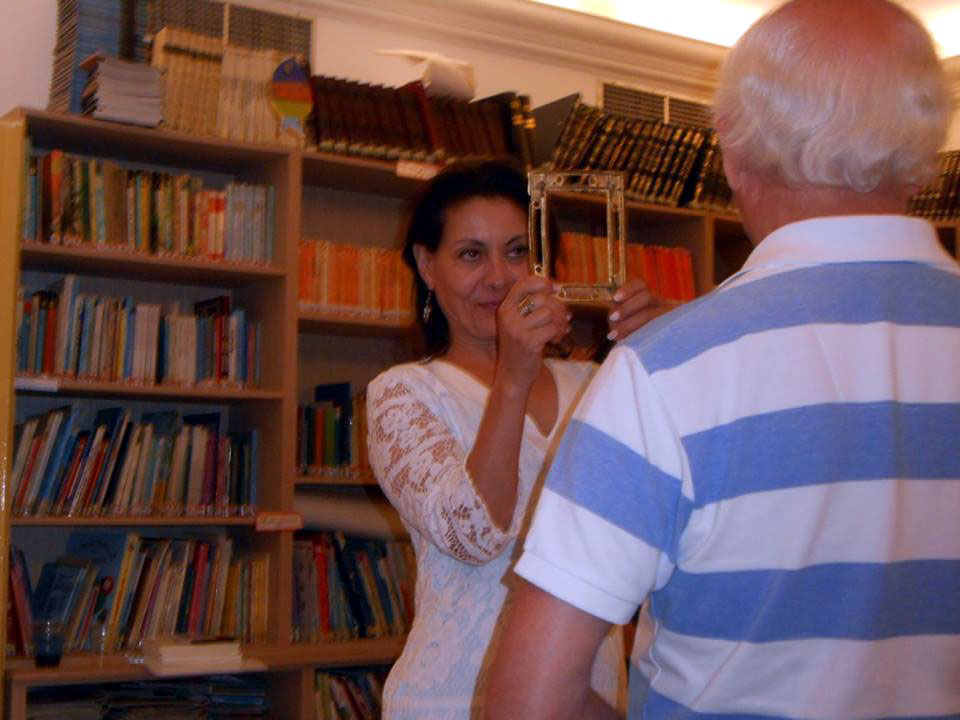
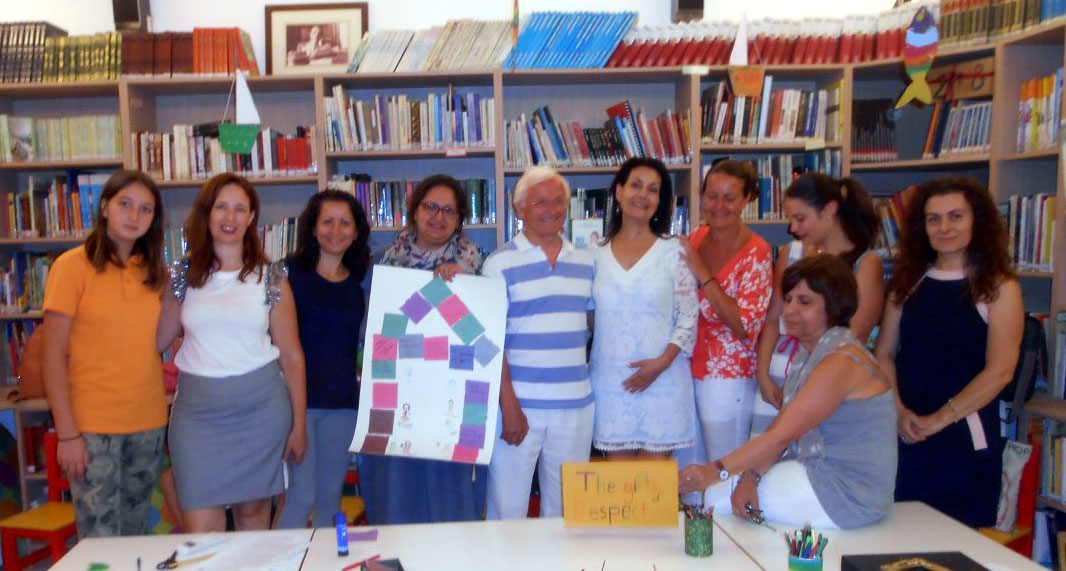
The names of the teachers are: Konstantina Egglezou, Emilia Lymberopoulou, Eirini Papanastasatou, Marioleni Parissi
Related files:
Love for stray animals - pdf / Motivation - mp3 / 2nd Grade - mp3
Kefalonia's protected animal species project - pdf / caretta-caretta - avi
Kindergarten Teachers on Corfu Embrace LVE
A successful LVE Workshop for 150 Kindergarten teachers was held on Corfu on March 12. Eleni Kosmetatou, the kindergarten consultant for the Ionian islands, and Sotiria Georgota, the kindergarten teacher in charge of educational programmes in Corfu, organised this event at the 7th Primary School in Corfu.
In the beginning, there was a brief presentation of the philosophy of values education and its relation to emotional intelligence. LVE was viewed as a holistic educational approach with an emphasis on respect for and acceptance of the individuality of children, students and individuals. As an icebreaker, educators were invited to form pairs and hold hands while trying to find and express three good qualities they saw in each other. After reporting to the whole gathering, they were asked to think of three good qualities describing themselves, somewhat harder to do for some. The point of this activity was that without identifying and appreciating students' good points and creating a bond with them, we cannot teach them anything nor build and promote values, for exploring values requires a way into their hearts. Equally, if we as teachers do not know and appreciate our own good qualities, we cannot give love or acceptance to students.
An exploration of the values of the those present followed. LVE sees educators as carriers and role models of values. Teachers went on to answer a questionnaire about the reasons they chose teaching as a profession which created a lively conversation.


After a short break, we focused on activities related to tolerance and participants were asked to refer to the way they handle problems such as student aggressiveness, racism and behavioural challenges in class. There was a reference to the use of active listening, conflict resolution and values activities that promote cooperation and unity in class.
Teachers later answered a questionnaire about their own beliefs and attitudes towards ethics and discussed specific problems they face in classes and how values could be applied to resolve them, or even better, prevent them from happening or happening in a severe way. They were asked to stand up, form circles, and participate in a bonding game.
It was a great audience and a lot more could have been discussed should there have been more time. Soteria Georgota and Eleni Kosmetatou are keen on organising a conference in Corfu in the summer of 2019. In general, it was a wonderful experience with plans for some of the participants to join us in Zante.
Submitted by Areti Foufopoulou
Kindergarten Teachers Embrace LVE on Kefalonia
Areti Foufopoulou, one of Greece's active LVE trainers and leaders, shares: "I am grateful to Eleni Kosmetatou, the kindergarten public school consultant for the Ionian Islands of Greece. She was introduced to me by Anda Katsaitou, who has been working with Values Education for more than five years on the island of Zante and who played a key role in the organization of the LVE Conference in July 2014 in Zante. My contact with Eleni resulted in her interest in promoting values activities on the island of Kefalonia. We agreed on the organization of a workshop for kindergarten teachers on 18th December. All the kindergarten schools in Kefalonia closed for the day so that 52 kindergarten teachers could attend the workshop, a beautiful display of true enthusiasm and interest in promoting values in their environment.
Discussion, questions and the facilitation of activities from the 'Living Values Activities for Children Ages 3-7' book took place along with a presentation of LVE philosophy for four and a half hours. The LVAC 3-7 book was sent to them electronically and it was agreed that was those applying the LVE methodology and facilitating LV activities in their class/school, could join us at the Zante Conference in July 2018.
New Materials and Benefical Projects with Children and Refugees
"LVE programs are currently running in many schools throughout Greece," shared Evangelia Manousou, the Secretary, for Somateio Aksies Zois stin Ekpaedefsi, the ALIVE Associate in Greece. "We run workshops with teachers, counsellors, parents and other interested parties, in addition to activities related to Mindfulness as a tool for educators and students."
Highlights of the last few years include:
- 2010 saw the release of a book of activities, written in Greek, in response to requests from teachers at our workshops. This is now in its second printing.
- 2012 through 2014, we did the Grundtvig (EEU) project with six partner countries, CONGENIAL (Connecting Generations) which culminated in the production of an open source ebook of our methodology. In 2014, we participated in the Clean Water Challenge, also with Students Rebuild.
- In 2015, an offshoot of the Connecting Generations project resulted in a second book, 'Love Stories', both in printed and ebook formats. This was the product of a multi-class project, entirely created by students documenting interviews of their grandparents via audio, video and photography. In November 2015, we also did various local projects in support of Syrian refugees, in response to the refugee crisis in Greece. That same year, we took part in Students Rebuild Healing Classrooms pinwheel project.
- Our fourth publication, 'Living Values in Education Activities Book', in Greek, is in early stages of production. On December 21, 2016, we celebrated our ten-year anniversary. In September 2016, we participated in activities alongside other volunteer groups in support of Wheeling2Help. From March to May, we completed teacher training with 15 participants."
2017
Practical and Enjoyable Experiences in Three Amazing Locations
In July 2017, Living Values Education was delighted to be hosted in three unique and amazing locations that beautifully captured the warmth of hospitality and spirit of the Greek people. They say that a picture speaks a thousand words. On this occasion, perhaps it would be more appropriate to say that a picture speaks 2000 words!
Unique Location 1 - A Garden in Lehonia
Mr Yannis Anastasiou kindly hosted two evening seminars for local Pilion region educators in his beautiful garden.
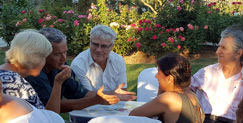
Our host Mr Yannis Anastasiou expressing the values of truth and friendship with his wife, co-organiser Mr Yannis Filtris, co-facilitator Ioanna Vasileiadou and the Pilion Poet.

The 'Baking of the World cake' from the Peace Unit of the "Living Values Activities for Children Ages 8-14" book. This activity, joyfully experienced by the educators, shows them forming the shape of a circular baking tin with the values ingredients gently cooking on the inside. The moral: All values are important. The clothes line in the foreground - strung between two trees - shows our wishes and hopes for a better world. Both activities are easily transferable to the classroom.
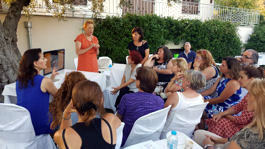
A deep discussion facilitated by special guest Marlies Ludding van Loon, ALIVE Associate member for the Netherlands, illustrating what can be practically achieved through Living Values Education in Holland. The reference to helping refugee children touched many hearts as Greece is currently caring for many refugees.
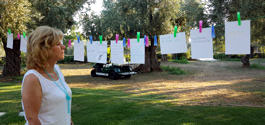


Three moments from the seminar ending with the value of story time and silent reflection as the full moon rose.
Unique Location 2 - Axion Esti School, Alli Meria, Volos
Axion Esti is a totally unique 'Arts School' that is eco-friendly and architecturally superb. Created by the visionary owner, Ms Glikeria, and the equally visionary architect, Mr Dimitris Phillippitzis, the school encapsulates and 'lives' and 'emerges', amongst others, a welcoming and positive emotional culture in an atmosphere where everyone feels loved, valued, respected, understood and safe.
The seminar for a youthful group of dedicated educators began with a mini practical activity to discover 'Who's values are these?' followed by a range of trust activities with humor and light-heartedness.
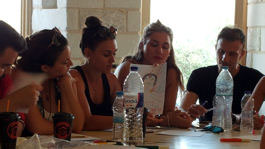
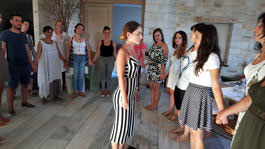
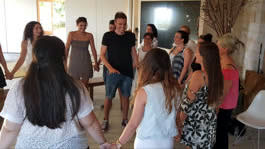
These three photos reflect the joy of these activities.

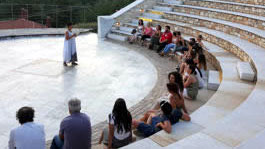

One of the highlights of the evening was 'Story Time' and 'Quiet Reflection' in the school's outdoor amphitheatre followed by a group photo.
These three photos first show Mr Dimitris leading the group into the amphitheatre where stories were shared, the group photo was taken and the evening sun brought the evening to a close. These pictures truly express more than what 2000 words can say.
Unique Location 3 - Xenopoulouli Children's Library, Zakynthos
According to the local press report:
An important meeting - workshop on 'Values of Life in Education' was organized by the Association of Friends of the Children's Library of Xenopoulouli at its premises. Through this event, friends, teachers and participants of the International Conference held in Zakynthos in July 2014, reunited to include the current President of the Association for Living Values Education International, Mr Christopher Drake, who came from Hong Kong, Vice President, Areti Foufopoulou, and former President and lover of the Greek spirit, Peter Williams.
After a presentation by members of the Association of Friends of the Xenopoulouli Children's Library of Values, which this year emerged through books and corresponding actions, it became an experiential workshop for adults on the subject of the universality of love.
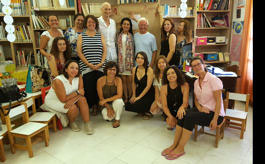
Group photo taken in the library.
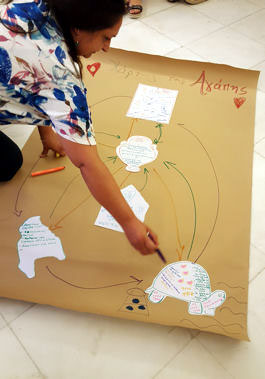
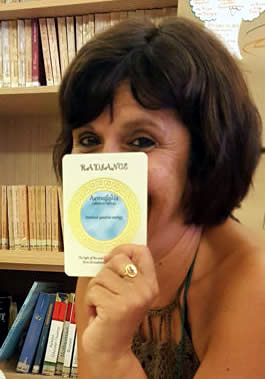
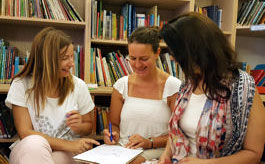

These show the 'Universality of Love' activity in action.
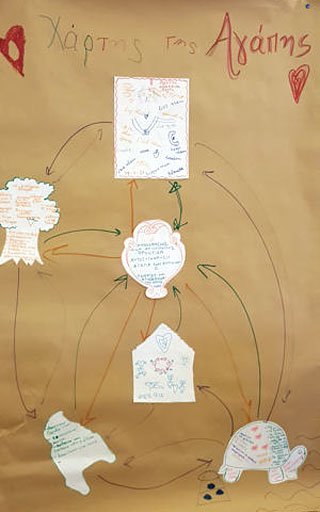
This illustrates the result of the activity. Six different shapes were given to pairs of participants to represent a house, a mirror, a tree, a rectangular piece of paper to draw a body, the island shape and a turtle (to represent the protected species on the island). The participants were invited to illustrate or write what that illustration meant to them. Once completed, the images and words were shared then glued onto a large sheet of paper. Once all illustrations and words were complete - it was discovered that we all see love in different ways and we are all connected. The Moral: Love is Universal.
The workshop ended with the signing of Peter's 'Ancient Wisdom for Modern Times' books, translated from English into Greek by Aggeliki Palatzidi.
What is totally unique about the library is that it is run entirely by volunteers, most of whom are mothers. Their dedication and practical example for others to follow, has brought many to their doors - especially children - to learn more about values, Greek myths, legends and how to live a life of values.
Living Values Education would like to extend our appreciation to them all, their key person, Ms Anda Katsaitou, and everyone who gives tirelessly from their heart with love.
Footnote:
Special thanks, too, to Areti Foufopoulou, Aggeliki Palatzidi and Yannis Filtis who organized all the logistics of the Lehonia and Volos programs - and Anda Katsaitou who organized the Zakynthos event - with their ever professionalism, kindness and altruistic joy.
Peter Williams
2016
An Assessment of the Benefits of LVE for Kindergarteners on Skyros
"The LVE programme inspired us as teachers to choose our personal, social, moral and spiritual values and to learn how to develop them practically," reported Sofia Livaditi, an educator who teaches kindergarten on the island of Skyros. "It also helped us approach education as a way of offering students a philosophy of life which enhances their general development, education and choices so that they will enter the community with respect, self-confidence and a sense of purpose. The programme ran from October 2014 to the end of the school year in June 2015.
We believe that our values programme helped children develop basic skills such as the ability to communicate effectively and to think with creativity and discernment. It also contributed to their sense of personal identity and autonomy as well as to their acquisition of social skills.
We also feel that we helped the children develop metacognitive strategies by announcing their conclusions to the team, telling the stories behind their paintings, expressing the difficulties they had faced in certain activities, asking questions and through self-evaluation.
The children's communicative skills grew through the sharing of their thoughts, emotions and ideas, discussions with the whole class, theatre, painting and team work. They explored imaginative worlds by acting in plays, inventing symbols and writing messages in the videos that we created of their work. Their thinking processes were enhanced through speaking, writing, painting, movement and theatre.
During our discussions, we used a number of different open questions which required different answers. Thus by sharing their attitudes and thoughts with other children, they understood that these thoughts were meaningful. Together, they constructed collective meaning in team discussions."
Cooperation with parents
"We asked the parents for their cooperation and they responded well. Some helped to transform the school playground. Others painted beautiful pictures on the walls and paved the front part. They made videos of our school celebrations, helped each other and exchanged material. They worked with us to decorate our classrooms. They created their own website where they exchanged opinions and ideas, often posting activities from a list of games provided by the school.
Parents also contributed to school charities by collecting clothes, food for orphanages and plastic taps for the Rhodes Red Cross. Driving the children to school also became easier, thanks to our values programme, when we talked about this in the unit on responsibility."
New Activities With Kidergarteners
Anda Katsaitoy, a kindergarten teacher on the island of Zante, shared some of the LVE Activities they have been doing in the last few months. Many of the activities are from the "Living Values Activities for Children Ages 3 to 7" book, while others are creative and cultural additions. You may wish to add some of Anda's ideas to your program!
In the month of November, we explored the values of Respect. One day a special guest, Dionisia Patra, talked with the 26 children aged 5 onwards:
- What is respect? (To feel good about myself, to treat people well, to respect differences.)
- How do we show our respect? (We listen to each other, we recognize that each of us is different.)
- We played the mirror game, We formed a circle and each of us, individually, went to a nearby room where she / he met a very special and unique person : her / himself!
- Holding hands, we all sang the LVE song together: "Each of us is beautiful."
- We made a circle and each of us mentioned two things she / he is good at.
- In the same circle we mentioned one special quality about the person next to us.
- At the end, we were divided into pairs and created a banner. On the upper part it was written: EVERY PERSON HAS SPECIAL QUALITIES"¦ SHE / HE IS UNIQUE"¦ IS COMPETENT"¦ IS GOOD...
- The lower part was divided into three sections with ribbons connecting them to the upper part. We wrote or painted on two pieces of heavy paper two things that we like about ourselves. On a third paper we wrote one thing / quality that we like about our partner. We offered it to our partner, who then attached it to her / his own construction.
The children's library continued with the 11 values of the LVE programme on 15th December 2015. In the classroom, we focused on the value of love. I read Angeliki Varela's book, Give Love with an Apple and then talked with ten children (aged 5 onwards):
- What is love? (Love is : to share, to care, to be kind, "¦)
- Why do our friends love us? (Because we are smiling, responsible, we sing and play with them and we love animals too!)
- Who do we love and why? What do we share with them? (Mum because she cares about us, our friend at school because we play together, Dad because we go to the mountains with him.)
- We found examples of love in literature: Elmer's friends, Snow White's prince, "¦
- We went on to find different types of heart that exist: sad, sensitive, bad, good, happy, cruel."¦
- Finally, we made a heart with the intention of offering it to the one we love most!!!
- Children also borrowed books about love. (They were deliberately the only ones displayed in the library.)
With the new year of 2016, we decided to devote January to happiness. We started reading the book, Mr Happiness and Mrs Unhappiness and went on to discuss:
- The meaning of happiness: I am happy when I see others being happy, I am happy when my friends love me, when I play with my friends.
- In which ways do we express our love? (With a hug, a bunch of flowers, a kiss, a painting with bright colours.)
- We went on with the book, asking. "What do you feel? Happiness or Unhappiness?"
We discussed this and realized that someone may be happy with very few, simple things.
We also searched literature for stories with happy ends such as Snow White and Greek fairytales.
Finally, we talked about happy moments in the library!!
We also mentioned other moments and activities of the library by the sea!!
Then we painted cards showing our happy moments and put them in the "Happy Box" of the library. We left them there to remind us"¦.
2015
Some Wonderful LVE Activities with a Kindergarten in Zante
Anda Katsaitou, an LVE teacher on the island of Zante, shared some of the activities she has been doing with her kindergarten class. Ms. Katsaitou keeps a folder for values work at school. She wrote, via a translation by Areti Foufopoulou, "Every time that the students complete activities for each value, we gather children's work in one smaller folder for each value in preparation for a presentation during programmed parents' meetings.
In November, we talked about peace as there is a national celebration devoted on the struggle against the Greek dictatorship in 1973. We read the book 'Mrs Democracy', and listened to the poem 'Peace' by Yannis Ritsos while painting and looking for the meaning of the word. We got acquainted with Pablo Picasso's work 'Guernica' and painted our own Guernicas. At the end of our unit of peace, we dramatized 'Peace', a work by Aristophanes, the ancient Greek poet and comedy writer. We put all the work in the folder of Peace and our colleague Sofia Livaditi from Skyros made a video on Peace which was sent to us and various other schools."
In December, Anda and the children explored Unity and Love. For Unity, "we examined what it means to be all together in class working for a common goal, what we can achieve together, and how to make the big tasks seem small and easy! We made a cake together and sang a circular song. We all made our Christmas bread, a Zante custom, with a grandmother who is also a teacher. We made a Christmas wreath and sang the song, 'If all the children on earth'. We wrote down the word 'unity' and painted what we could imagined. Then we discussed animal unity, after becoming inspired by animal stories about birds, elephants and dolphins."
For Love, "we talked about love after reading a book by Angeliki Varela, 'Give love'. Love means to share, to care, to be gentle"¦. From a religious point of view, we talked about Christ's love for people, and also about Saint Denise, the protector of our island Zante and the Saint of forgiveness. As a team, we printed 'I am loveable because ____.' We danced with our hearts in our arms, hearts that we made of paper and coloured. We offered it to a dear friend, we found the various types of heart that exist, such as sad, sensitive, bad, good, happy and cruel. We wrote the word LOVE and painted what came to mind. For our Christmas celebration we dramatized the fairy tale 'Fricadella the witch who hated carols' by Eugene Trivizas. Then, we put the heart that our friend gave us in the folder of love along with a painting from the fairy tale, 'Give love' and the team work 'I am loveable because _____'."
In January we explored respect. "We started with the question, 'What is respect?' Respect is too listen to others carefully. We played a game with a microphone. Each student took turns singing his or her favourite song and the others applauded or did not listen at all"¦. What were the feelings of the singer? Respect is to treat people, friends and animals well. Respect is to know that each one is unique and important, to appreciate ourselves and to help our friends at school. While listening to soft music, we showed what we could do with our hands: caress, play an instrument, greet others, paint, embrace and send a kiss. Then, we all painted as a team 'I make good things with my little hands' and each child shared his/her idea after forming his/her palm on the paper. We also read the fairy tale 'Elmer the colorful elephant' and pointed out that each one is unique, so afterwards each child painted the self who was different from the others. Next, after discussing everyone's strong points/qualities, we placed them on a necklace. Students went on to work in pairs and say a good word for their partners. We wrote down the word 'respect' and painted it.
We have formed a corner of values in the classroom where we add one more value every time we deal with it. We also made a values calendar for the new year and each child was offered a copy for their family.
In Greek - ΣΕΒΑΣΜΟΣ:
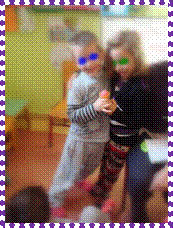
Τι είναι ο σεβασμός??
- Îα ακοÏμε με Ï€Ïοσοχή τους άλλους(παίξαμε το παιχνίδι με το μικÏόφωνο, καθÎνας Ï„ÏαγουδοÏσε Îνα αγαπημÎνο του Ï„ÏαγοÏδι και οι υπόλοιποι τον χειÏοκÏοτοÏσαν ή δεν τον άκουγαν καθόλου..ποία είναι τα συναισθήματα?
- Îα συμπεÏιφεÏόμαστε καλά στους ανθÏώπους, στους φίλους μας και στα ζώα.
- Îα γνωÏίζουμε ότι ο καθÎνας μας είναι μοναδικός και αξιόλογος.
- Îα εκτιμοÏμε τους εαυτοÏÏ‚ μας.
- Îα βοηθάμε τους φίλους μας στο σχολείο.
Με απαλή μουσική αναπαÏαστήσαμε τι μποÏοÏμε να κάνουμε με τα χÎÏια μας( να χαϊδÎψουμε, να παίξουμε μουσικό ÏŒÏγανο, να χαιÏετίσουμε, να ζωγÏαφίσουμε, να αγκαλιάσουμε, να στείλουμε Îνα φιλί). Μετά ζωγÏαφίσαμε μια ομαδική ζωγÏαφιά με το τίτλο «Î¼Îµ τα μικÏά μου χÎÏια κάνω καλά Ï€Ïάγματα» και το κάθε παιδί είπε την ιδÎα του Î±Ï†Î¿Ï ÏƒÏ‡Î·Î¼Î¬Ï„Î¹ÏƒÎµ τη παλάμη του.

Από τη πλευÏά της λογοτεχνίας διαβάσαμε το παÏαμÏθι «Î•Î»Î¼ÎµÏ ο παÏδαλός ελÎφαντας» και διαπιστώσαμε για μια ακόμη φοÏά ότι ο καθÎνας είναι μοναδικός, για αυτό και στη συνÎχεια το κάθε παιδί ζωγÏάφισε τον εαυτό του (όπου ήταν και διαφοÏετικός με τον άλλο) και στη συνÎχεια ÏστεÏα από συζήτηση βάλαμε σε κολλιΠτα Ï€ÏοτεÏήματα του καθενός. Στη συνÎχεια είπε το κάθε Îνα «Îνα καλό λόγο για το διπλανό του»!

ΓÏάψαμε τη λÎξη «ÏƒÎµÎ²Î±ÏƒÎ¼ÏŒÏ‚» και ζωγÏαφίσαμε.
Στη γωνιά της γÏαφής κάθε φοÏά Ï€ÏοσθÎτουμε και μία αξία.
Για τη καινοÏÏγια χÏονιά φτιάξαμε το ημεÏολόγιο των αξιών για κάθε παιδί το οποίο και δόθηκε στις οικογÎνειες τους με σκοπό και τη διάχυση του Ï€ÏογÏάμματος eTwinning
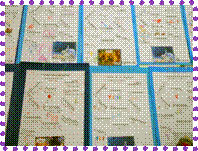
ΦεβÏουάÏιος 2015
ΕΥΤΥΧΙΑ
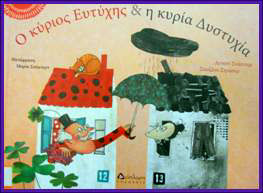
- Όταν πάω βόλτα με τν μπαμπά στα βουνά (ΜΑΚΗΣ)
- Όταν παίζω βόλεϊ με τους φίλους μου (ΚΩÎ/ÎΟΣ)
- Όταν παίζω ποδόσφαιÏο στη θάλασσα (ΘΟΔΩΡΗΣ)
- Όταν πήγα ΠαÏίσι με τους γονείς μου (ΤΟÎΙΑ)
- Όταν βÏÎχει και είμαι στο σπίτι μου(ΑÎΔΡΕΑΣ)
- Όταν κοιμάμαι στο σπίτι της γιαγιάς μου (ÎΟÎΙΚΑ)
- Όταν πάω για μπάνιο με τους φίλους μου (ΦΑΙΔΡΑ)
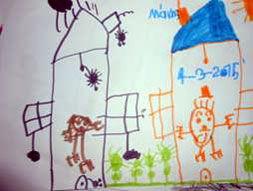
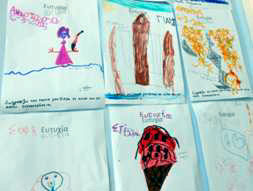
ΤÎλος με μουσική αποτυπώσαμε Îναν ευτυχισμÎνο κόσμο!!!
ΜΑΡΤΗΣ 2015
ΑΛΕΞΑÎΔΡΑ ΚΑΤΣΑΪΤΟΥ
ΥΠΕΥΘΥÎΟΤΗΤΑ
- Συζητήσαμε τι είναι η υπευθυνότητα ?? να κάνω τη δουλειά μου, να νοιάζομαι, να κάνω ότι καλÏτεÏο μποÏÏŽ, να φÏοντίζω τα Ï€Ïάγματα βοηθώ τους άλλους όταν το Îχουν ανάγκη.
- Εξ' αιτίας της διαφοÏετικότητας (που μιλήσαμε μÎσα στο ΦεβÏουάÏιο) παίξαμε το παιχνίδι «Ï„α μάτια βλÎπουν» Îνα παιδί είχε κλειστά τα μάτια και το άλλο ήταν ο οδηγός του, μετά μιλήσαμε για τα συναισθήματα τους.

- ΧωÏίσαμε τις γωνιÎÏ‚ της τάξης σε ομάδες ευθÏνης : Îτσι η βιβλιοθήκη, το κουκλόσπιτο, τα παιδαγωγικά παιχνίδια, τα μολÏβια και οι μαÏκαδόÏοι τα ανÎλαβαν διαφοÏετικÎÏ‚ ομάδες παιδιών.
- ΓÏάψαμε τις ιδÎες μας τι μποÏοÏμε να κάνουμε για μια καλÏτεÏη τάξη: να την στολίζουμε με ζωγÏαφιÎÏ‚, να φυτÎψουμε λουλοÏδια, να αγαπιόμαστε, να μοιÏαζόμαστε τα Ï€Ïάγματα, να βοηθάμε ο Îνας τον άλλο, να πεÏιμÎνουμε τους άλλους για να φάμε.
- Συζητήσαμε για τα επαγγÎλματα των γονιών μας και για τα καθήκοντά τους μÎσα και Îξω από το σπίτι. ΤÎλος για το τι δουλειά θα ήθελαν να κάνουν όταν μεγαλώσουν και για το τι θα είναι υπεÏθυνοι ( ο κηπουÏός για ατ φυτά του, η δασκάλα για τα παιδιά της, η Ï„ÏαγουδίστÏια για τη φωνή της)κ.α
- ΓÏάψαμε τη λÎξη «Ï…πευθυνότητα» και ζωγÏάφισαν το αντικείμενο που είναι ο καθÎνας υπεÏθυνος μÎσα στη τάξη.
- ΤÎλος φυτÎψαμε και όλοι ήταν υπεÏθυνοι και για το λουλοÏδι τους!!!!
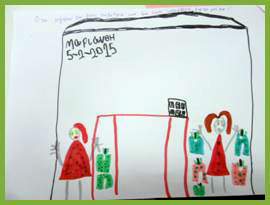
ΦεβÏουάÏιος 2015
2014
Awareness Seminar in Athens - Open versus Closed Communication
Areti Foufopoulou, a high school teacher and the Vice-President of ALIVE, holds regular LVE seminars for educators in Athens. On 20 December, she led a seminar titled "Awareness: Its importance to the educational process and life in general". The main points are below, with links to questionnaires for teachers and students.
1 - Definitions
Awareness is self knowledge "¦ alertness "¦ being in the here and now "¦ mindfulness.
Distinguishing awareness at the cognitive level is different from the concepts of mindfulness/spirituality and the Buddhist vacuum.
The meaning: knowing my physical state and emotions.
2 - Self and awareness
Self-esteem, self-control, knowing my strong and weak points. Areti then presented awareness as seen from a few theories of personality.
3 - Being in the here and now, from clinical use to the school environment and life
The patient in the therapeutic process is asked to focus on the here and now and the therapist by means of empathy, respect and genuine involvement is called to listen actively to the patient, bringing forward and clarifying problems, fears and obstacles.
A helpful process in the school environment; exploring the needs and emotions of the students.
Exploration of student self-esteem and attitude towards the educational environment.
4 - Awareness and Values
Which values are related to awareness in the school environment?
Principles, emotional intelligence.
Peace, concentration/focus, simplicity, trust, readiness, respect
Choice range-motives
5 - Awareness and planning of an educational programme
Lack of awareness in the educational process is the main reason for low participation, lack of limits, ineffectiveness and deviating behavior.
Attention problems and awareness.
Emotions that we bring to the class/school as educators.
Joy, relief, satisfaction, justification, anxiety, stress, sorrow, disappointment, depression.
Teacher awareness is in direct correlation with student awareness.
Feelings are contagious.
6 - Strategies that create a climate which enhances awareness
Exploration of student needs
Exploration of student cognitive style (Gardner)
Negotiated rules and limits
Circle time
Active listening
Emotional expression
Art, music
Silence time
Time planning that allows for exploration and awareness of goals tasks
Creation of internal motives
Development of emotional intelligence/enhancement of self-image.
Conscious development of values in class
7 - Obstacles
Low self-esteem and a punitive policy against deviating behavior
Mechanistic memorizing of information; sterile emphasis on detail
Lack of flexibility and adaptation to the needs of the here and now
Avoidance of problem tackling; Lack of limits and impulsivity
8 - Action-reaction effectiveness and then what?
Distinguishing between informed action and impulsive action
Goal setting that lies in the search for meaning in learning and life in general.
Focus on the here and now of the educational process in regard to broader aims.
Working on the ultimate purpose of the educational process.
9 - Communication systems and awareness
Virginia Satir defines closed and open communication systems.
In a Closed System: self-esteem is low; communication is indirect, vague, inscrutable, inconsistent, and growth-preventing; ways are of attack, compromise, reckoning and misleading; rules are outdated, inhuman and unchangeable, individuals change their needs to adapt to set rules and there are restrictions to comments. The result is chaotic, destructive and inappropriate.
In an Open System: self-esteem is high; communication is direct, clear, definite, proper and growth-enhancing; ways are direct; rules are clear, modern, human, change when necessary and there is freedom for comments. The result is reality-based, appropriate and creative.
10 - Questionnaires
2013
A Seminar of "Values, Morality and Wellbeing"
23 November 2013 - Athens, Greece
The main subject of the seminar was how values held by students and teachers shape the learning experience and affect the quality of interaction and student performance.
There were ten secondary teachers present who contributed their own experiences with students' ethos and attitudes.
They received a questionnaire to answer and take away for their own use with their students. Click here for a copy of the questionnaire.
Research shows that morality, or the existence of moral principles and values, is connected with satisfaction and happiness in life because it gives meaning to life and triggers creativity, harmonious relationships and an optimistic outlook.
Participants were also given a sheet presenting the main views on morality through the ages - from ancient Greece to modern times. This generated a lively discussion.
Finally, the Values Education approach was presented as a bank of ideas and tools to be used in the classroom in order to raise student awareness and promote their understanding and adoption of universal ethical principles.
Strategies of looking into and promoting student values
- Use of questionnaires-dilemmas for looking into student values>-Circle time for expression of student emotions
- Class discussion about issues that emerge in school and demand resolution - values awakening
- The box of emotions
- The Constitution of the class - negotiation of rules and limits
- Film showing in order to discuss choices upon moral issues
- Setting of specific time devoted on a specific value each week
- Doing values activities in class
- Cooperative writing of a story based on a specific value.
- Creation of a class climate of acceptance and freedom with limits concerning behavior.
- Positive reinforcement of solidarity and cooperative behavior.
- Avoidance of victimization and punishment.
- Stabilising of rules with consistency and fairness.
- Allowing for time and space for student expression of feelings.
- Availability of the teacher for individual discussion with students upon request.
Greece: LVE in Zante
In March, an introductory seminar on LVE took place for teachers on Zante. Topics covered strategies for developing a healthy class climate, creating positive self-concepts, building empathy, and implementing values-based discipline to manage the classroom. Participants learned how to introduce values to their classrooms and schools, the importance of parental and community involvement and how to achieve this. Specific tools such as self-observation, self-questioning and self-acceptance as well as the value of silence and visualization, effective use of circle time and reflection points were studied. Another area of emphasis was the importance of switching from 'reaction' to 'action' through active listening, conflict resolution and role playing following the LVE model.
Trainer, Areti Foufopoulou, writes, 'Values Education is a continuous process where feedback from students, colleagues, parents and the community is constantly given in explicit and implicit ways. Improvement in class climate and student behavior will gradually build up and function as an incentive for further development."
The teachers received information on Daniel Goleman's Emotional Intelligence as well as his multiple intelligence model. A discussion on the ways interpersonal and intrapersonal emotion intelligence manifest in the classroom, school and society followed. Finally, the impact of the relationship between high emotional intelligence and gender development and gender issues was also investigated.
The LVE Team in Greece conducts monthly seminars in Athens and is currently engaged in ongoing LVE Workshops in Zante.
Areti Foufopoulou
An introductory LVE Seminar in Zante on 22-23 March 2013
A Questionnaire on Teacher Incentives
2011
Values Education's Role in Addressing Teaching Burnout
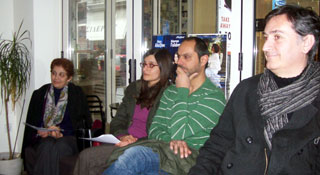
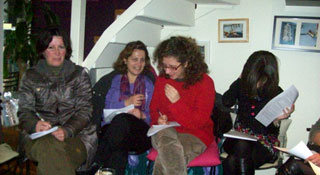
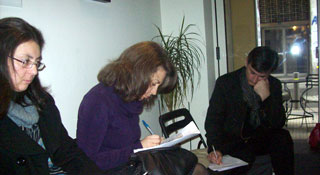
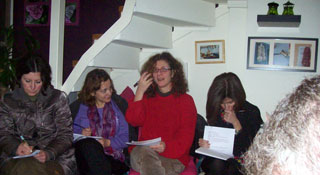
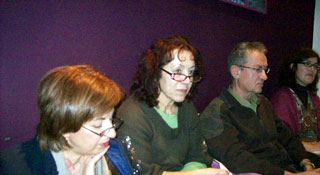
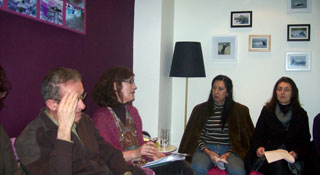


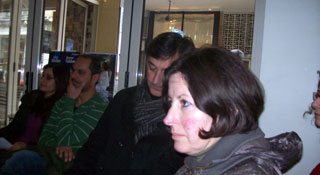

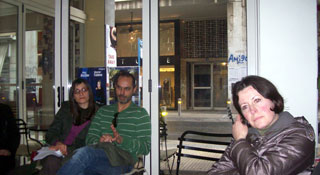
Recently a seminar was held in Athens to look at different parameters that contribute to teacher burnout and explore ways to alleviate stress and create a greater sense of wellbeing through personal factors and values education. One aim of the four-hour seminar was to develop awareness of the complexity of the issue, rather than share detailed knowledge of theories. A second aim was to examine how an individual teacher can deal with classroom management, student communication and learning in a constructive way by drawing on her/his own resources - mental, physical, emotional - and applying those despite the number of external factors affecting the job.
After discussing causes of teacher burnout and identifying demands of the job, the focus shifted to the importance of values education. This was seen as a means of improving the learning process and communication in the classroom in a deep, holistic way as values education involves individual philosophy and making conscious, informed decisions which gradually lead to personal transformation. What became clear through dialogue and participatory activities was that the responsibility for one's well- being and effectiveness as a teacher lies mostly in inner factors and that systematic work with one's values and goals enhances effectiveness. It was also concluded that self reflection can definitely make a difference.
The attendees participated in a warm way, shared freely and became genuinely involved in the activities and discussions. A beautiful self-reflection activity absorbed everyone and participants were reminded of the importance of introducing this to students.
The seminar ended with everyone sharing one important reason for wanting to continue being a teacher and/or a personal goal for themselves as a teacher in the future. A new seminar is being planned for this spring.
Areti Foufopoulou
Download Seminar details: Teacher Burnout Seminar (14 January 2012, Athens)
Bullying - Strategies for Reducing Violence at School
Bullying is a phenomenon related to various personal, social, school, and family parameters and causes. A recent workshop in Athens by the Greek LVE Association looked at physical, emotional, verbal and non-verbal violence in the school environment.
Nowadays, the increase in bullying manifests in different ways in the school environment. Related to this is the general deconstruction of principled contexts, confusion about vital social values and the deterioration of moral standards along with an escalation of poverty and unemployment caused by the general economic crisis. During the workshop, different manifestations of bullying at school were identified, possible reasons explored, as well as a view of short and long term effects of bullying on victims.
The participants discussed the values of respect, cooperation, tolerance, serenity, awareness, trust, love, honesty, self-confidence, sharing and unity as means to forestall or decrease school violence. Many strategies were suggested for reducing bullying: developing a cooperative classroom climate, having a positive focus on individual differences, meeting the personal needs of the students, enhancing emotional intelligence, setting limits, creating behavioral contracts, using active listening, providing opportunities for student communication and input in planning and goal setting to ensure relevancy. The incorporation of values education into the school curriculum was identified as important.
Below are three activities from the bullying workshop:
- Participants stand, forming a circle while holding hands. They are asked to share one or two weaknesses or dark qualities that caused them insecurity or pain during their school years/whether they were laughed at or bullied for these and how they overcame (if they eventually did) the pain.
- Participants are asked to reflect on ways in which they were involved in bullying at school or in the family/community, then write short notes of these incidents and share with the team (if they feel comfortable doing so). They are also asked to recall the emotions behind A and B. This brought up very interesting and touching memories. Participants mentioned bullying against/from siblings and this led to a discussion about the way both teachers and parents contribute to the victimization of students/children.
- Vicky Papadopoulou presented The Box of Emotions. This beautifully decorated box is placed in the class at the beginning of the year and students deposit notes anonymously expressing a feeling related to a school/family or community incident - complaint, satisfaction, joy, sadness "¦ making a short reference to the reason behind it. The teacher collects the papers, transcribes them on the computer and at a certain point in time, returns them at random to the class. Everyone receives one scenario and comments on the incident/feelings. The box can be used to spot bullying incidents if students are asked to write about a person who has harmed them in any way at school or elsewhere and the feelings that this caused.
Areti Foufopoulou
Alexandra Katsaitou was recently introduced to LVE. As Headmistress of a kindergarten school in Kerion, Greece, she shared some values activities on love, peace and friendship that she has used for years. Please click on this file to read about the activities.
Peace and Friendship -- 3-7 activities from Greece DOC
In Athens, the LVE team frequently holds seminars for local educators. Below you will find information contributed by Areti Foufopoulou from two recent seminars, one on bullying and another on values and gender stereotypes.
Values and Gender Stereotypes Seminar: The LVE Team held a special four-hour seminar on Saturday, 20 October 2012, titled Female and Male Values and their Characteristics: Fact or Myth? Challenging gender role stereotypes at school. The content of the seminar is available at this link. Stereotypes Seminar
Bullying Seminar: Bullying is a phenomenon related to various personal, social, school, and family parameters and causes. A recent workshop in Athens by the Greek LVE Association looked at physical, emotional, verbal and non-verbal violence in the school environment.
Nowadays, the increase in bullying manifests in different ways in the school environment. Related to this is the general deconstruction of principled contexts, confusion about vital social values and the deterioration of moral standards along with an escalation of poverty and unemployment caused by the general economic crisis. During the workshop, different manifestations of bullying at school were identified, possible reasons explored, as well as a view of short and long term effects of bullying on victims.
The participants discussed the values of respect, cooperation, tolerance, serenity, awareness, trust, love, honesty, self-confidence, sharing and unity as means to forestall or decrease school violence. Many strategies were suggested for reducing bullying: developing a cooperative classroom climate, having a positive focus on individual differences, meeting the personal needs of the students, enhancing emotional intelligence, setting limits, creating behavioral contracts, using active listening, providing opportunities for student communication and input in planning and goal setting to ensure relevancy. The incorporation of values education into the school curriculum was identified as important.
Below are three activities from the bullying workshop:
- Participants stand, forming a circle while holding hands. They are asked to share one or two weaknesses or dark qualities that caused them insecurity or pain during their school years/whether they were laughed at or bullied for these and how they overcame (if they eventually did) the pain.
- Participants are asked to reflect on ways in which they were involved in bullying at school or in the family/community, then write short notes of these incidents and share with the team (if they feel comfortable doing so). They are also asked to recall the emotions behind A and B. This brought up very interesting and touching memories. Participants mentioned bullying against/from siblings and this led to a discussion about the way both teachers and parents contribute to the victimization of students/children.
- Vicky Papadopoulou presented The Box of Emotions. This beautifully decorated box is placed in the class at the beginning of the year and students deposit notes anonymously expressing a feeling related to a school/family or community incident - complaint, satisfaction, joy, sadness "¦ making a short reference to the reason behind it. The teacher collects the papers, transcribes them on the computer and at a certain point in time, returns them at random to the class. Everyone receives one scenario and comments on the incident/feelings. The box can be used to spot bullying incidents if students are asked to write about a person who has harmed them in any way at school or elsewhere and the feelings that this caused.
2009 April
ΦθινόπωÏο 2009
10 ΟκτωβÏίου ΕÏγαστήÏιο με θÎμα: "Επίλυση συγκÏοÏσεων'' στο βιβλιοπωλείο ΠαÏάθυÏο στην εκπαίδευση, ΜαυÏομιχάλη 5 τηλ.
16-17 ΟκτωβÏίου, ΗμεÏίδα για τις Αξίες Ζωής στην Εκπαίδευση, στη Θεσσαλονίκη
7 ÎοεμβÏίου, ΕÏγαστήÏιο Αξιών Ζωής για τους εκπαιδευτικοÏÏ‚ Î Ïωτοβάθμιας της ΚαλλιθÎας. ΄
5 ΔεκεμβÏίου, ΕκλογÎÏ‚ για νÎο Δ.Σ. του Σωματείου, στο βιβλιοπωλείο "ΠαÏάθυÏο στην Εκπαίδευση του παιδιοÏ" ΜαυÏομιχάλη 5 Αθήνα
PROGRAMMED EVENTS FOR FALL 2009
10 October Workshop on Conflict Resolution at The Window to Children's Education Bookshop, 5 Mavromihali Street, Athens, tel. 2103601365
16-17 October Day Event on Values in Education, Thessaloniki
7 November, Workshop on Living Values for Primary State School Teachers of Kallithea
5 December Election of New Board of the Association of Living Values in Education, Greece at The Window to Children's Education Bookshop, 5 Mavromihali Street, Athens
Ταξίδι στη γη της αγάπης PDF
For the March 2008 Newsletter PDF
There has been great interest in the Living Values in Education Program in Greece. Our association has been holding two-hour seminars in which we introduce the ALIVE association, present an introduction to the LVEP and, then, conduct LVEP activities on one particular value: October 2007 -"Freedom", November 2007 - "Cooperation", December 2007 - "Respect", January 2008 - "Love" and February 2008, ""Responsibility"". Fortunately, we have been offered hospitality by bookshops with seminar rooms where we hold these workshops. Once our membership grows we will be able to have our own premises. Many educators in Greece are happy and willing to come to two-hour workshops because they often work long hours; we intend to hold a proper LVEP Train-the-Trainers weekend in Fall 2008 so as to offer all a deeper insight into LVEP.

A Special Project on the island of Chios
Teachers at ten nursery and primary schools are implementing LVE on the island of Chios with the leadership of Sofia Tanaini and other teachers.
Introduction - Goals:
A child who is able to communicate, express feelings and thoughts, find ways of resolving the conflicts s/he experiences, is much more free to exploit his/ her abilities, and invest his /her energy in creative goals, being at the same time more competent to get over life difficulties.
Keeping these thoughts in mind, the ten-school team started the planning of the programme. The first goal was for the teachers of the team to get to know each other and feel the group dynamics themselves with a view to setting common objectives. Then, the differences between the schools and age of students were brought up and there were various suggestions in regard with ways and activities to bring students and teachers closer. This procedure lasted for a whole year and proved to be very important, as communication and feedback invigorated teachers themselves both mentally and emotionally and contributed to the realization of our goals. In the each of the ten schools, one or two teachers are involved with LVE. We hope that in time all the teachers at each school will be involved.
Our Goals for the Children:
- To get to know themselves and the world around them in a better way and acquire certain communication skills.
- To bond together, recognise that each is different, important and unique, explore advantages and disadvantages to cooperation and promote it.
- To acquire self-knowledge, identify their abilities, desires, traits, appreciate themselves and get recognition from others.
- To understand that getting older and changing is a process common to living creatures, but different pace-wise for each of us.
- To explore similarities and differences among people of different teams, realise that differences enrich life and learn how important mutual tolerance and respect are.
- To understand the importance of effective communication, get training in skills that promote true relationships, control impulse, and get used to getting in each other's position.
- To learn to control impulsive reactions when under pressure and resolve differences in ways different from those of anger, aggression, and submission.
- To set realistic personal goals.
- To learn to evaluate their training and their progress in it.
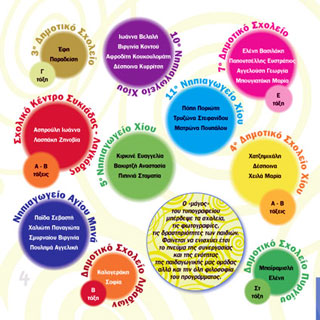
Our common goal was to give emphasis to socialization, verbal expression, a cooperative spirit and team work. Informing and sensitising their family and close environment were first priorities. This meant that we were concerned to get the parents and community involved. Cooperation with local Authorities and organizations not only contributed to the success of the programme but also gave adults the chance to examine their own emotional life as well as that of their children.
Methods Used:
We applied the different stages of a project for the realization of the LVE programme.
As for the work in class, we used techniques of experiential learning since it focuses on children and lets them explore attitudes, values and ideas in a safe, non- threatening way, exchanging experience to their own benefit.
Such techniques were.
- brainstorming
- stream of consciousness
- mutual commitment to sticking to certain rules, contract signing
- team work
- role play
- dramatization
- artisic creation
The approach had always a holistic, interscientific and subject-based angle, so that most sciences and abilities were taken into account.
Various activities were used, based on speech, discussion, communication and exploration. A lot of activities emphasized artistic expression, dramatization and drama games on different subjects.
The programme gave both teachers and students the chance to work with imagination, creativity and fun, to get beyond the syllabus and "learn, explore and taste".
Evaluation
A systematic evaluation of the programme proved to be a hard procedure, on the one hand because its aims concerned mainly emotional processes and we do not have the suitable tools and sufficient education to reliably comment on the possible emotional changes on the part of the kids, and on the other, because the whole procedure was for us also, an unpredictable journey in the land of emotion and the degree to which we were involved, does not permit us to objectively evaluate what occurred. In general ,we could say that in the part of expressing and handling emotions, the change in the attitude of the children in terms of being able to talk about their feelings was obvious. And in the field of self-image, we saw "low profile" children demand more space and change the pattern of their behaviour with the rest of the children.
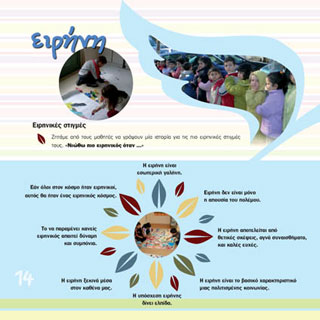
It is true that such programmes are hard to evaluate, since their results emerge gradually in the future. What became clear, is the necessity of such programmes that address not only the gnostic part but also their emotional world. The programme gave students the chance to ask themselves questions and have fun in an original way. They expressed their feelings, got to know each other, discussed, realised the importance of human relationships and became more competent in handling conflict and delaying gratification. The children started exploring and trusting each other, talked and expressed their preferences, emotions and difficulties they faced. They learnt to respect the rules they set. They discovered hidden abilities and grew more confident.
The local community needs initiatives that will promote new values and interests and bring up subjects to discuss and explore. In this framework, the opening of the school to society and the benefit of the impact, brings students and parents closer. Apparently, parents were the immediate recipients of their changes and emotions. In the programme, there was no bad, mediocre or good student. There was the painter, the story-teller, the actor/actress... Self-involved kids overlooked their needs for the benefit of the team. Chidren with learning difficulties surprised everyone with their host of knowledge, vocabulary and drama skills. Children's contact with emotion and its expression by means of their thoughts and desires is an issue of life-long education. However, it's now time to take a first step and realise that emotion is a prevalent element in their life, the key to both a "normal" social life and the conquest of knowledge itself. Only when we as teachers realise that emotional intelligence should have its place in our everyday learning process will children have the chance to live in a school that respects their differences and personal needs.
H Ï€ÏοσÎγγιση του Ï€ÏογÏάμματος «Î‘ξίες Ζωής στην Εκπαίδευση»
Το ÏŒÏαμα,,θεμελιώδεις αÏχÎÏ‚ και Ï€ÏακτικÎÏ‚ της Εκπαίδευσης Αξιών Ζωής.
Δήλωση οÏάματος
Οι Αξίες Ζωής στην εκπαίδευση (LVE) είναι Îνας Ï„Ïόπος θεώÏησης της εκπαίδευσης που Ï€Ïοωθεί την ανάπτυξη κοινοτήτων για μάθηση βασισμÎνη σε αξίες και θÎτει την αναζήτηση για νόημα και σκοπό στην καÏδιά της εκπαίδευσης.Το LVE δίνει Îμφαση στην αξία και ακεÏαιότητα κάθε ατόμου που ασχολείται με την παÏοχή εκπαίδευσης στο σπίτι , στο σχολείο & την κοινότητα..Με την υιοθÎτηση μιας ποιοτικής εκπαίδευσης , το LVE υποστηÏίζει την συνολική ανάπτυξη του ατόμου και μία κουλτοÏÏα θετικών αξιών σε κάθε κοινωνία και σε όλο τον κόσμο πιστεÏοντας ότι η εκπαίδευση είναι μία σκόπιμη δÏαστηÏιότητα με συγκεκÏιμÎνους στόχους σχεδιασμÎνη να βοηθήσει την ανθÏωπότητα να ανθίσει.
Θεμελιώδεις ΑÏχÎÏ‚.
Η εκπαίδευση των Αξιών Ζωής βασίζεται στις ακόλουθες θεμελιώδεις αÏχÎÏ‚:
Σχετικά με το πεÏιβάλλον μάθησης & διδασκαλίας.
- Όταν οι θετικÎÏ‚ αξίες και η αναζήτηση νοήματος και ÏƒÎºÎ¿Ï€Î¿Ï ,τοποθετοÏνται στην καÏδιά της μάθησης και διδασκαλίας,,η εκπαίδευση η ίδια αποκτά αξία.
- Η μάθηση ενισχÏεται ιδιαίτεÏα όταν συμβαίνει σε μία κοινότητα μαθησιακή που στηÏίζεται στις αξίες και όπου οι αξίες αυτÎÏ‚ εκδηλώνονται μÎσω μιάς διδασκαλίας με ποιότητα και οι μαθητÎÏ‚ διακÏίνουν τις συνÎπειες που Îχουν για τους ίδιους , τους άλλους και τον κόσμο γενικά , τόσο Ï€Ïάξεις που βασίζονται όσο και άλλες που δεν βασίζονται σε αξίες.
- Για να καταστήσουν Îνα μαθησιακό πεÏιβάλλον βασισμÎνο στις αξίες δυνατό ,οι εκπαιδευτÎÏ‚ όχι μόνον απαιτείται να Îχουν κατάλληλη διδακτική εκπαίδευση ποιότητας και συνεχιζόμενη επαγγελματική ανάπτυξη , επίσης χÏειάζεται να αξιολογοÏνται θετικά οι ίδιοι , να δÎχονται Ï„Ïοφοδότηση και στοÏγή μÎσα στην μαθησιακή κοινότητα.
- ÎœÎσα στην μαθησιακή κοινότητα τη βασισμÎνη σε αξίες , θετικÎÏ‚ σχÎσεις αναπτÏσσονται από την φÏοντίδα που όλοι όσοι εμπλÎκονται Îχουν ο Îνας για τον άλλο.
Σχετικά με την διδασκαλία των αξιών
- Η ανάπτυξη ενός Î¼Î±Î¸Î·ÏƒÎ¹Î±ÎºÎ¿Ï Ï€ÎµÏιβάλλοντος βασισμÎνου σε αξίες, είναι Îνα αναπόσπαστο κομμάτι της εκπαίδευσης αξιών και όχι Ï€ÏοαιÏετικό.
- Η Εκπαίδευση αξιών δεν είναι μόνον Îνα θÎμα στο Ï€ÏόγÏαμμα . Î Ïώτιστα , είναι παιδαγωγική.-μία εκπαιδευτική φιλοσοφία και Ï€Ïακτική που εμπνÎει και αναπτÏσσει θετικÎÏ‚ αξίες στην τάξη.Η διδασκαλία , η βασισμÎνη σε αξίες και η καθοδηγοÏμενη αυτοσυγκÎντÏωση, υποστηÏίζουν τη μάθηση σαν μία διαδικασία νοηματοδότησης , συμβάλλοντας στην ανάπτυξη της κÏιτικής σκÎψης , της φαντασίας, της κατανόησης, της αυτογνωσίας, των ενδοπÏοσωπικών & διαπÏοσωπικών δεξιοτήτων και του ενδιαφÎÏοντος για τους άλλους.
- Οι αποτελεσματικοί/ες εκπαιδευτÎÏ‚/ιες αξιών, Îχουν επίγνωση των δικών τους σκÎψεων , αισθημάτων , στάσεων και συμπεÏιφοÏάς και είναι ευαίσθητοι /ες σχετικά με την επίδÏαση που Îχουν αυτά στους άλλους.
- Ενα Ï€Ïώτο βήμα στην εκπαίδευση αξιών, είναι για τους δασκάλους/ες να αναπτÏξουν μία καθαÏή και ακÏιβή αντίληψη των δικών τους στάσεων,συμπεÏιφοÏάς και συναισθηματικής νοημοσÏνης σαν Îνα βοήθημα για να βιώνουν τις δικÎÏ‚ τους αξίες..
Ισως τότε να βοηθήσουν τους εαυτοÏÏ‚ τους και ενθαÏÏÏνουν άλλους να ανασÏÏουν τα καλÏτεÏα στοιχεία από τις δικÎÏ‚ τους Ï€ÏοσωπικÎÏ‚ , πολιτισμικÎÏ‚ και κοινωνικÎÏ‚ ιδιότητες , κληÏονομιά και παÏαδόσεις.
Σχετικά με τη φÏση των ατόμων μÎσα στον κόσμο και τη θεώÏηση της εκπαίδευσης .
9.Στο επίκεντÏο της θεώÏησης της εκπαίδευσης μÎσα στο πλαίσιο των αξιών ζωής,βÏίσκεται μία άποψη των Ï€Ïοσώπων σαν σκεπτόμενων , αισθανόμενων ολοκληÏωμÎνων ανθÏώπινων υπάÏξεων με αξία, πολιτισμικά διαφοÏετικών που ωστόσο αποτελοÏν μÎλη μιας παγκόσμιας οικογÎνειας.Η εκπαίδευση Ï€ÏÎπει γι αυτό να ασχολείται με την καλή διανοητική συναισθηματική , πνευματική και σωματική κατάσταση των ατόμων.
10. Η θεώÏηση της εκπαίδευσης , της σκÎψης , του συναισθήματος και της Ï€ÏοσφοÏάς /απονομής αξίας στους άλλους είναι και αναλυτική και ποιητική.Το να εγκαθιδÏυθεί Îνας διάλογος σχετικά με τις αξίες, μÎσα στο πλαίσιο μιας μαθησιακής κοινότητας βασισμÎνης σε αξίες διευκολÏνει μία διαπÏοσωπική , διαπολιτισμική ανταλλαγή σχετικά με τη σημασία και τα μÎσα της εκδήλωσης/εμπÎδωσης αξιών στην εκπαίδευση.
ΔÏαστηÏιότητες
Κατά την αναζήτηση επίτευξης της αποστολής του και εφαÏμογής των θεμελιωδών αÏχών του, το ΔιεθνÎÏ‚ Σωματείο των Αξιών Ζωής παÏÎχει:
- ΕπαγγελματικÎÏ‚ σειÏÎÏ‚ μαθημάτων , σεμινάÏια και εÏγαστήÏια για δασκάλους και άλλους οι οποίοι εμπλÎκονται στην παÏοχή διδασκαλίας.
- Διδακτικό υλικό τάξης και άλλους εκπαιδευτικοÏÏ‚ πόÏους, συγκεκÏιμÎνα μία βÏαβευμÎνη σειÏά Ï€Îντε βιβλίων με υλικό που πεÏιÎχουν Ï€ÏακτικÎÏ‚ δÏαστηÏιότητες, για τις αξίες και μία ποικιλία μεθόδων για χÏήση από εκπαιδευτικοÏÏ‚ , διευκολυντÎÏ‚, γονείς και παιδαγωγοÏÏ‚ για να βοηθήσουν τα παιδιά.και τους νεαÏοÏÏ‚ ενήλικες να εξεÏευνήσουν και αναπτÏξουν 12 ανθÏώπινες αξίες που αναγνωÏίζονται οικουμενικά σαν Ï„Îτοιες.Η Ï€ÏοσÎγγιση και το πεÏιεχόμενο των μαθημάτων είναι βιωματικής , συμμετοχικής και ευÎλικτης μοÏφής, αφήνοντας και ενθαÏÏÏνοντας τα υλικά να Ï€ÏοσαÏμόζονται ,και να συμπληÏώνονται ανάλογα με τις διαφοÏετικÎÏ‚ κουλτοÏÏες και κοινωνικÎÏ‚ και άλλες συνθήκες.Η Ï€ÏοσÎγγιση και τα υλικά μποÏοÏν επίσης να χÏησιμοποιηθοÏν συστηματικά σε συμφωνία με τις παÏαπάνω αÏχÎÏ‚ με τον ÏŒÏο «Î•ÎºÏ€Î±Î¹Î´ÎµÏ…τικό Î ÏόγÏαμμα Αξιών Ζωής».
2. Συμβουλευτική σε κυβεÏνήσεις , οÏγανισμοÏÏ‚ , σχολεία , δασκάλους και γονείς σχετικά με τη δημιουÏγία μαθησιακών πλαισίων βασισμÎνων σε αξίες και τη διδασκαλία των αξιών.
3.Μία διαλεκτική , πολυγλωσσική ιστοσελίδα (www.livingvalues.net) για χÏήση Ï…Î»Î¹ÎºÎ¿Ï Ï‡Ï‰Ïίς χÏÎωση.
Εκταση της χÏήσης
Η Ï€ÏοσÎγγιση και το υλικό των Αξιών Ζωής χÏησιμοποιοÏνται το Ï„ÏÎχον διάστημα και παÏάγουν θετικά αποτελÎσματα σε σχεδόν 80 χώÏες σε πεÏίπου 8.000 εκπαιδευτικά πλαίσια . Ενώ τα πεÏισσότεÏα από αυτά είναι σχολεία , άλλα είναι κÎντÏα καθημεÏινής φÏοντίδας , κÎντÏα νεότητας , σÏλλογοι γονÎων , κÎντÏα για άστεγα παιδιά, κÎντÏα υγείας και καταλÏματα Ï€ÏοσφÏγων.Τουλάχιστον Îνα μÎÏος από το υλικό των Αξιών Ζωής LVE είναι διαθÎσιμο σε πεÏίπου 30 γλώσσες..Η Ï€ÏοσÎγγιση είναι μη καθοδηγητική και δίνει τη δυνατότητα στο υλικό και τις στÏατηγικÎÏ‚ να παÏουσιάζονται ανάλογα με τις συνθήκες , τα ενδιαφÎÏοντα των χÏηστών και τις ανάγκες των μαθητών.
Δομή
Η εφαÏμογή του Ï€ÏογÏάμματος Αξιών Ζωής συντονίζεται από τον Διεθνή ΟÏγανισμό για τις Αξίες Ζωής στην Εκπαίδευση (ΑLIVE INTERNATIONAL), υποστηÏίζεται από την UNESCO και μία πλειάδα άλλων οÏγανισμών, Ï€ÏακτοÏείων, κυβεÏνητικών σωμάτων, ιδÏυμάτων , κοινοτήτων και ατόμων .
Αποτελεί μÎÏος της παγκόσμιας κίνησης για Îνα πολιτιστικό πεÏιβάλλον ειÏήνης στο πλαίσιο της ΔιεθνοÏÏ‚ δεκαετίας των ΗνωμÎνων Εθνών για Îνα πολιτισμό ΕιÏήνης και μη βίας για τα παιδιά του κόσμου.
To διεθνÎÏ‚ Ï€ÏόγÏαμμα ALIVE φÎÏνει κοντά εθνικοÏÏ‚ φοÏείς των Αξιών Ζωής σε διάφοÏες χώÏες και είναι Îνας ανεξάÏτητος οÏγανισμός που δεν Îχει καμμία συγκεκÏιμÎνη ή αποκλειστική ,θÏησκευτική , πολιτική ή εθνική σÏνδεση ή ενδιαφÎÏον.
:

2001 May
"The Munting Nayon Community School in Athens, which is run by the Philippines' Association, has adopted Living Values in their curriculum. Values education already has a place in their education system, but the teachers are particularly happy with the activities that we offer and also the way we go deeper into the values for their own self-development. For the last eighteen months I have been giving training on an ad hoc basis to their teachers, but from September 1999 the principal and teachers decided that they would like me to continue values training with the teachers once a month when they have their teachers' meeting. They are very serious and enthusiastic during these sessions and have a genuine interest to go deeper into the values, what they mean personally and how they can really put them into practice in their everyday lives. There is a refreshing honesty in their desire to learn and to improve. Already we are starting to see changes in the educators themselves and I think this is already visible in the classroom. Formal evaluations have not yet been done, but I will introduce this idea during our next meeting on 28th January 2000.
TESOL Macedonia Thrace - 7th Annual Convention, 16-17 October 1999
"The title of this two-day event was "Reflections and Directions". On Saturday 16th October, George Mavroudis presented a workshop entitled "How to Create Leaders: The Challenge of Future Education". George explored the skills needed to prioritise properly what to teach and how to teach and asked the question "How do you motivate students to actively participate rather than comply with 'orders'?" He also examined those factors that foster trust in the classroom. On Sunday, as the Living Values Education Coordinator for Greece, I presented a workshop on "Facilitating Learning, Facilitating Language" which took educators through several practical steps, and a process of self-questioning, to identify those areas of the teacher's changing role that can influence the quality of language learned by students. A lot of interest was generated. One participant is a member of the TESOL board and he later emailed to offer cooperation and a venue for future activities in Thessaloniki. The venue was the University of Macedonia-Thrace in Thessaloniki and the event was attended by about 300 people.

TESOL Greece Mini-Convention on Sunday 3lst October l999 held at the British Council in Athens
"As the Living Values Education Coordinator I was asked to present a workshop in the multimedia section and talked about "The Influence of Technology on Life in the Classroom". I noted that as we move into the new millennium the use of computers and video in classroom teaching is no longer an opportunity but a necessity. In the workshop I showed how technology can have a positive and beneficial influence on the quality of educating our students and how to create the right attitudes towards technology in language teaching and in the creation of an active and positive learning environment.
Amongst the participants was a Montessori school teacher with her own school in Kifissia in the northern suburbs of Athens. She was so impressed by the forum and the Living Values Programme that she invited me to give a presentation in her home to a group of parents. Twenty-five people turned up at 8 pm on 19th December 1999 and we left at after midnight! The evening was lively, with 18 very enthusiastic parents who listened attentively to the presentation and then spent 90 minutes firing questions at me about values, how we can teach them to children, how we can model them, etc. As a result, we will have monthly meetings with this parent group starting in January 2000.
Living Values gets a new partner!
"Andrew Betsis publishing house in Athens has offered us a place to conduct training seminars and offered it free of charge, because we give our services free of charge. They will also do all the advertising and mailing of invitations. The following seminars were held:
30th January 2000 - Eight Steps Towards Creating Good Relationships
26th February 2000 - Education without Fear
1st April 2000 - Communication Skills: Active Listening and Conflict Resolution
22nd and 23rd April 2000 - Educator Training in Values-Based Education
TESOL Greece published my full paper in their July-September quarterly journal. The title: "Learning to Be: A Values-based Approach to Language Learning" had been presented at their 21st Annual Convention in March. They included a synopsis of all twelve values. The journal has a circulation of about 2000."

